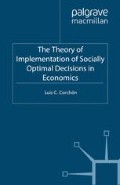Abstract
In this chapter we will study the implementation of social choice functions by means of dominant strategies. Our first result is the so-called Revelation Principle which says that a necessary condition for implementation in dominant strategies is that there exist a direct mechanism — that is, a mechanism where each agent announces her characteristic — for which to reveal the true characteristic is a dominant strategy, in other words, truth-telling is an equilibrium (Proposition 1). We will also see how, if truth-telling is a dominant strategy, it is a Nash equilibrium and vice versa (Proposition 2). In section 3.3 we will study the incentives to tell the truth in economic environments. We will prove that under reasonable conditions there is no truth-telling mechanism, either in private good economies or in public good economies (Propositions 3 and 4). In section 3.4 we will see how if the preferences are quasi-linear and the full Pareto efficiency of the allocation as well as the individual rationality of the outcomes are not required, there is a mechanism in which the truth is a dominant strategy and the decision regarding the public good is optimal (Proposition 5). Under some additional conditions this mechanism is unique (Proposition 6). However, if individual rationality is assumed, any mechanism which induces truth-telling will almost always produce inefficient results (Proposition 7). Finally, section 3.5 is devoted to studying the incentives to reveal the true initial endowments also with similar negative results (Proposition 8).
Access this chapter
Tax calculation will be finalised at checkout
Purchases are for personal use only
Preview
Unable to display preview. Download preview PDF.
References
The impossibility theorems for economies with private goods, with public goods and in social choice environments can be found respectively in L. Hurwicz (1972), ‘On Informationally Decentralized Systems’ in R. Radner and C.B. McGuire (eds), Decision and Organization: A Volume in Honor of Jacob Marshak (Amsterdam: North-Holland) pp. 297–336.
J. Ledyard and J. Roberts (1974) ‘On the Incentive Problem with Public Goods’, Discussion Paper 116, Center for Mathematical Studies in Economics and Management Science, Northwestern University.
M. Satterthwaite (1975), ‘Strategy-Proofness and Arrow’s Conditions: Existence and Correspondence Theorems for Voting Procedures and Social Welfare Functions’, Journal of Economic Theory, vol. 10, pp. 187–217.
A. Gibbard (1973), ‘Manipulation of Voting Schemes: A General Result’, Econometrica, vol. 41, pp. 587–602.
This last article also established the revelation principle for the first time. Other papers dealing with the Gibbard—Satterthwaite theorem are: S. Barbera and B. Peleg (1990), ‘Strategy-Proof Voting Schemes with Continuous Preferences’, Social Choice and Welfare, 7, pp. 31–8
L. Zhou (1991), ‘Impossibility of Strategy-Proof Mechanisms in Economies with Pure Public Goods’, Review of Economic Studies, 58, pp. 107–9.
The following paper characterizes strategy-proof mechanisms in pure exchange economies: S. Barbera and M. Jackson ‘Strategy-Proof Exchange’, Econometrica, (forthcoming).
The original papers on the Clarke—Groves mechanism are E. Clarke (1971), ‘Multipart Pricing of Public Goods’, Public Choice, pp. 19–33
T. Groves (1973), ‘Incentives in Teams’, Econometrica, 41, pp. 617–631.
A good exposition of the Clarke—Groves mechanisms, where the space of public projects is {0, 1}, can be found in the book by Laffont (1988), Fundamentals of Public Economics (MIT Press).
The following book concentrates on the study of such mechanisms. J. Green and J.J. Laffont (1979), Incentives in Public Decision Making (Amsterdam: North-Holland).
Proposition 5 outlined in this chapter was first proved in T. Groves and M. Loeb (1975), ‘Incentives and Public Inputs’, Journal of Public Economics, 4, pp. 311–326.
The proof of proposition 6 was taken from J.J. Laffont and E. Maskin (1980), ‘A Differential Approach to Dominant Strategy Mechanisms’, Econometrica, 48, pp. 1507–20.
Proposition 7 is a simpler version of a theorem established by M. Walker (1980), ‘On the Nonexistence of a Dominant-Strategy Mechanism for Making Optimal Public Decisions’, Econometrica, vol. 48 pp. 1521–40
L. Hurwicz and M. Walker (1990), ‘On the Generic Nonoptimality of Dominant-Strategy Mechanisms: A General Theorem that Includes Pure Exchange Economies’, Econometrica, vol. 58 no. 3. pp. 683–704.
The version offered in the text is taken from C. Bevia and Corchôn, L. (1995), ‘On the Generic Impossibility of Truthful Behavior’, Economic Theory, 6, pp. 365–71.
The original article on the manipulation of initial endowments is A. Postlewaite (1979), ‘Manipulation Via Endowments’, Review of Economic Studies, vol. 46, pp. 245–262.
See also W. Thomson (1979), ‘Comment’ in Laffont (ed.), Aggregation and Revelation of Preferences (Amsterdam: North-Holland) pp. 428–30.
Author information
Authors and Affiliations
Copyright information
© 1996 Luis C. Corchón
About this chapter
Cite this chapter
Corchón, L.C. (1996). Dominant Strategies and Direct Mechanisms. In: The Theory of Implementation of Socially Optimal Decisions in Economics. Palgrave Macmillan, London. https://doi.org/10.1057/9780230372832_3
Download citation
DOI: https://doi.org/10.1057/9780230372832_3
Publisher Name: Palgrave Macmillan, London
Print ISBN: 978-1-349-39758-7
Online ISBN: 978-0-230-37283-2
eBook Packages: Palgrave Economics & Finance CollectionEconomics and Finance (R0)

